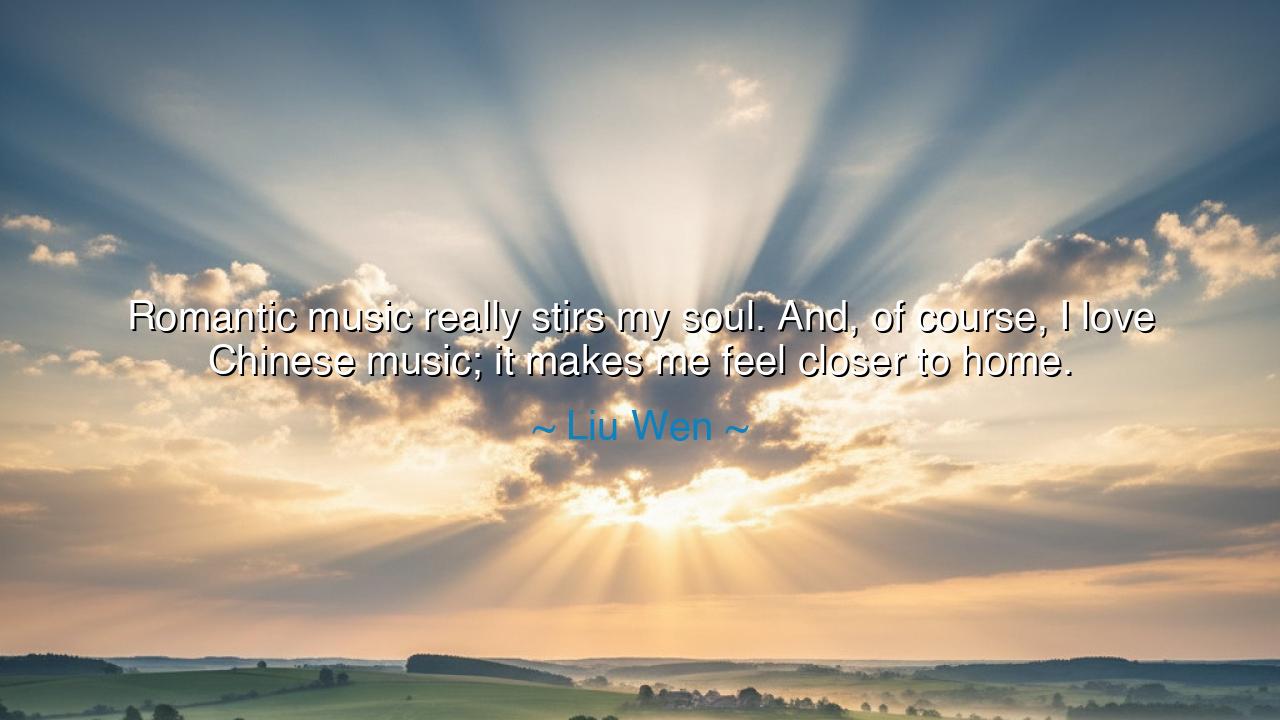
Romantic music really stirs my soul. And, of course, I love
Romantic music really stirs my soul. And, of course, I love Chinese music; it makes me feel closer to home.






In the words of Liu Wen, “Romantic music really stirs my soul. And, of course, I love Chinese music; it makes me feel closer to home.” Here lies a truth as old as humanity itself: that sound is not merely vibration of air, but the very breath of memory, identity, and spirit. Music has always been the bridge between the heart and the infinite. It awakens within us the forces of longing, of remembrance, and of love that words alone cannot carry. When Liu Wen speaks of Romantic music stirring her soul, she echoes the cry of countless generations who have found in melody the spark that ignites passion and tender reflection alike.
The Romantic music she names recalls the great age of Western composers who sought not only to entertain but to reveal the inner landscapes of the human heart. Chopin, Liszt, Tchaikovsky—these were masters who painted emotion with notes, making sorrow majestic, and joy thunderous. Their works do not merely pass through the ear; they settle in the marrow, urging us to feel more deeply, to live with grandeur, to embrace love and pain alike as sacred fires of existence. To be stirred by Romantic music is to awaken to the truth that within us lies a soul vast and uncontainable.
But Liu Wen also speaks of Chinese music, and here the teaching deepens. For in every land, in every culture, music is not only art but also root. To hear the strings of the guzheng, the haunting cry of the erhu, or the clear tone of bamboo flutes is to be reminded of ancestors, of rivers and mountains, of language and ritual. To love the music of one’s people is to remember where one comes from; it is to drink from the well of identity. Thus, when she says it makes her feel “closer to home,” she reveals the eternal role of music: not only to stir the soul forward, but also to anchor it backward, binding us to the soil from which we have risen.
History bears witness to this truth. In the time of exile, Chinese poet Qu Yuan, cast away from his homeland, wandered the riversides and composed verses of longing. It is said that he would sing them aloud to the waters, letting his sorrow pour into melody. His people, centuries later, still recite his songs, still celebrate the Dragon Boat Festival in his memory. His example shows us that music and poetry become vessels of home, carrying one’s identity across time, across distance, across the veil of death itself. Like Qu Yuan, all who are torn from their land cling to song as a way to remain whole.
The lesson is clear: music is more than entertainment; it is nourishment of the soul and a compass of the spirit. Romantic music teaches us to feel more, to embrace passion and grandeur, while Chinese music—or the native music of any people—teaches us to remember who we are and where we belong. Both are needed: the universal and the particular, the fire that lifts us beyond ourselves and the roots that ground us in our origin. Without both, a soul wanders half-awake, restless and unfulfilled.
Therefore, O listener, take heed. Do not let music pass by your ears as though it were nothing. Seek it out, embrace it, let it shape you. Listen to the great masters of other lands, for they will expand your heart beyond its narrow walls. But also listen to the songs of your own people, for they will remind you of your home, of your ancestors, of the heritage that flows in your blood. In this union, you will find not only joy but also wisdom, not only pleasure but also strength.
And what then should you do? Each day, set aside time to let music speak to you. When your heart grows weary, play a piece of Romantic music and let its waves awaken your courage. When you feel adrift or far from who you are, turn to the music of your people, and let its voice call you back to home. In this practice lies a secret: you will never be truly lost, for wherever music is, there too is your soul, alive, awake, and eternal.






AAdministratorAdministrator
Welcome, honored guests. Please leave a comment, we will respond soon